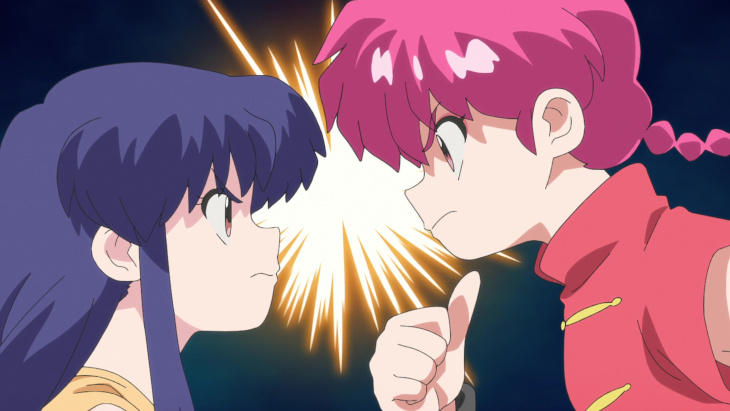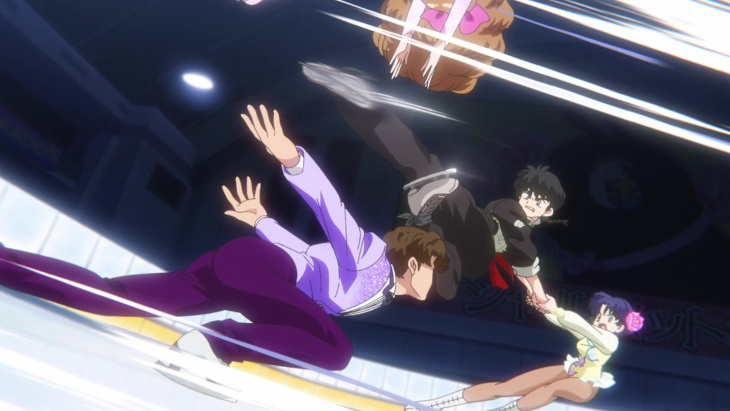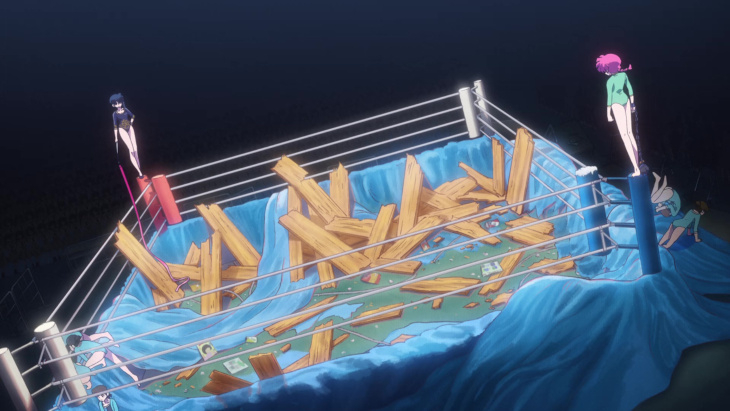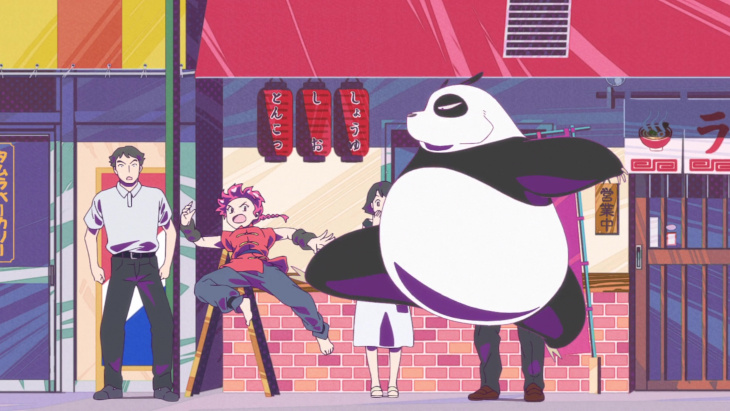
“He is Ranma of the Saotome School of Anything Goes Martial Arts, and Ranma has a problem. He transforms into a girl when he’s splashed with water.”
Nostalgia is an odd emotion, both for those experiencing it, and for those watching others experience it. Until this season, I was one of those individuals who had never directly encountered Ranma ½, though I was, of course, familiar with the premise. When this remake started airing, I was struck by the number of anime critics who proclaimed affection for the original, as well as dismay regarding this version’s censorship. I honestly wasn’t planning on watching this series, but it was sitting there on Netflix and I needed to put something on one evening while cooking, so… Here we are.
This sounds a bit negative to me, but I want to establish that I don’t regret the time I spent with this show. It is, however, a product of its time, and despite decent comedic chops and occasionally fun fight scenes, it doesn’t hold up as a classic of the medium. It’s certainly aged better than Inuyasha, but I was already contemplating dropping the show, even before we learned that season 1 was only going to be 12 episodes. Still, if you want to sample a narratively and visually cleaned up time capsule of 80’s anime, this is probably the best way to do it… assuming you don’t care for Jojo.

If you’re not familiar with the premise of Ranma ½… I suppose I should explain what “anime” is first, but I don’t have time. Still, a quick recap can’t hurt. The show follows the titular Ranma, a young man whose father, unbeknownst to Ranma, made a promise to a fellow martial arts master that their children would marry and carry on as heads of the dojo. This leads to Ranma being paired with Akane, a proficient fighter who is entirely disinterested in romance. However, there is one further complication. Both Ranma and his father, Genma, became cursed while training in China. Now, whenever Ranma is splashed with cold water, he transforms into a girl (his father turns into a panda), and he will not turn back into a boy until he is splashed with warm water. Hijinks ensue.
The series biggest problem is that it isn’t content to have simply romance subplots and martial arts subplots. Every arc seeks to combine them in intentionally ludicrous, but often unfunny ways. We can’t just have martial arts rivals. They all need to have a romantic interest in the proceedings. And we can’t just have a romantic rival. They all need to be proficient in some insane fighting style. In this 12 episode run, we had plots about combat gymnastics, combat figure skating, and combat-induced selective amnesia. Not every rival needs to be of both the romantic and combat variety!
The series appears to be under the delusion that the comedy will make these ridiculous plotlines easier to swallow, but it isn’t up to the challenge. I’ll admit I laughed from time to time, but even comedies have to cope with suspension of disbelief, and mine went to get milk during the fight with the ice skating sex-pest and never came back.

In spite of my distaste for some storylines, I can see how this came to arguably be Rumiko Takahashi’s most popular series, even outdoing Inuyasha in volumes sold. Ranma and Akane do have some nice moments together, even if the show often feels the need to hit the reset button, lest we progress too quickly. It also seems that domestic violence, which is intended to be charming, is a recurring theme in her works, though, unlike Inuyasha, it was periodically able to evoke a chuckle from me.
The side characters are a real mixed bag. I enjoyed Akane’s family dynamic, and both of the fathers succeeded in evoking laughs, terrible though they may be. On the other hand, the romantic rivals all seem to be varying flavors of sex-pest. When this catalogue of creeps isn’t being disgusting, they usually end up just wearing on the nerves. Like the comedic domestic violence that Takahashi is seemingly fond of, this gallery of nutcases feels very much like a product of the time, and it hasn’t aged well. This is a problem that many revivals suffer from, but to provide context, I found Ranma’s attempts at humor far more palatable than those from Sailor Moon Crystal. So, while the antagonists go into the minus column, their annoying elements thankfully don’t ruin the show.

Many of the writing components may feel dated, but MAPPA’s fresh coat of paint does go a long way towards glossing over the cracks. I’ve heard some criticism of the censorship decisions made with the show, but I honestly wouldn’t have batted an eye at any of them. Maybe I’m used to the tighter restrictions of modern anime produced for a broad international audience, but the decision to avoid showing Ranma’s nipples or butt-crack didn’t stand out to me as much as it clearly did to other critics. Furthermore, MAPPA’s crisp pop-art style helped elevate what humorous moments it could, and lent the action a nice, frenetic energy. The OP and ED are both pleasant, though I usually chose to skip them. I’d state the music, in general, didn’t stick with me.
Before I wrap up, a few Notes and Nitpicks:
- I watched some of the first episode of Sailor Moon Crystal back when it first aired, but didn’t make it all the way through. I found the lead insufferable, and while I contemplated sticking with it for a review, it seems unfair to suffer through something you know isn’t working for you, just to write a negative review when you aren’t even the target audience.
- I’d heard about the character Shampoo prior to watching the series, and I remain unclear whether I hate her or not. Her story in this season is certainly stupid. However, when you grade it on a curve, based upon the other arcs, it isn’t that bad. The attempts to make you feel bad for her in the last episode were laughable, though.
- I watched some anime in the 90’s, but didn’t get the opportunity to properly dive into the medium until the mid-2000’s, so I lack a lot of the mid-90’s-anime nostalgia that my generation possesses. As for earlier anime, my exposure is limited to say the least.
- I originally assumed that this show would be long-running. As I mentioned, I was considering dropping it at the end of the season, so this break comes at an opportune time. I won’t reject the possibility of watching the second season, but I can appreciate the break from the show.
Ranma ½ is up there with the likes of Dragonball and Bubblegum Crisis when it comes to pioneering 80’s anime… that I have no attachment to whatsoever. Despite my lack of connection with the material, I still found this revival’s first season to be fun, even if it follows narrative and comedic paths that have become well-trodden. If you have an affinity for the original material or are simply curious, then Ranma ½ is worth checking out, though I won’t guarantee it will keep your interest.




Add comment